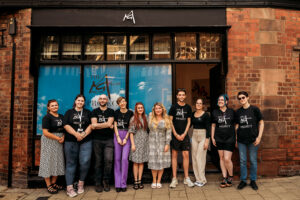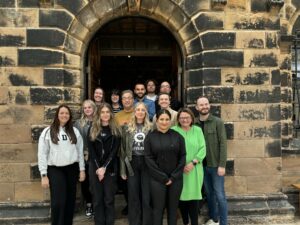Your feedback matters and will make a difference. Help us understand your digital experience by taking our 10 minute survey. Your responses are completely anonymous. Start the survey.
News
“Mental health support is not a one size fits all….take the first step and reach out” this mental health awareness week
TWO HIGHLY commended services helping people in communities with mental health support are among those being highlighted as part of mental health awareness week.
Led by the Mental Health Foundation, Mental Health Awareness Week (MHAW) aims to encourage conversation and reduce stigma around mental health.
This year’s theme is ‘community’, and community is at the heart of the work delivered by The Martin Gallier Project and We Connect social prescribing service.
The Martin Gallier Project is a charity that offers support around suicide prevention and intervention, as well as offering care for people who are affected by suicide. They offer non-clinical support on the high street to any individual over the age of 16 who may be considering suicide, with no barriers to access, waiting list, or criteria.

The project, which was recently ‘highly commended’ at the Health Service Journal’s Partnership Awards for work done in collaboration with Cheshire and Wirral Partnership NHS Foundation Trust, runs drop-in centres in communities on the Wirral and in Chester – where the kettle is always on for a cuppa and with someone there to listen – as well as telephone support to anyone in the North West region.
Jessica Gallier-Booth, Chief Executive Officer at The Martin Gallier Project, said: “Our aim is to break the stigma around suicide by being accessible to everyone in the community and normalising conversations about it. We believe that open discussions can lead to better prevention and support.
“We are proud of our ongoing work and the journey towards creating a future where every life is valued, and every suicide is preventable.”
Gemma, 33, turned to the Martin Gallier Project when she needed help. With advice and support from connecting with the project, Gemma was given hope and able to see a positive future for herself. Gemma now uses that lived experience and supports others in the community within her Cancer Care Co-ordinator role and as a listening volunteer.
“No one should have to walk in their own shadow and help is out there,” she said.
“Mental health support is not a one size fits all – but by taking the first step to reach out, you can be given advice that can start a journey to link you with the right services for you.
“I’d encourage anyone to connect with others, friends, family, or professionals, and share how you are feeling. Don’t go through it alone.”
In Halton, the We Connect social prescribing service, which was also Highly Commended in the Primary and Community Care Project of the Year category at the HSJ Partnership Awards 2025, and is delivered by Wellbeing Enterprises CIC with NHS partners, supports around 3,500 patients each year and helps people with practical, social, and emotional needs, while building strengths and capabilities through tailored education and training.
Wellbeing Link Workers co-create personalised wellbeing plans and connect individuals to local support. When Simon’s mother died unexpectedly, he didn’t know how he would afford the rent on his family home. With support from his Wellbeing Link Worker, Simon accessed welfare advice and secured some financial assistance.
This gave Simon the breathing space he needed to grieve for his mother and adjust to his circumstances. Simon is now actively looking for work.
He said: “My life changed so suddenly, and I didn’t think I could cope, but with support from my Link Worker I was able to break down my problems and tackle them one by one. I feel things are getting better each day now”.
87% of people using the service are reporting improved wellbeing levels and 67% reduced anxiety levels. The service also eases pressure on GPs and tackling the root causes of poor health, We Connect delivers lasting outcomes for people and communities.
Mark Swift, Chief Executive Officer and Founder at Wellbeing Enterprises CIC said: “Every year, we support thousands and thousands of people across the borough to build on their strengths and improve their wellbeing.
“We’re delighted to offer this service thanks to funding from the NHS. The recent pandemic and now the cost of living crisis is putting a strain on people and families and it can be difficult to know where to turn to for help when needed. Our dedicated We Connect team are here to help through every step of the process.”

Mental health conditions can affect people very differently, with some people needing hands-on support from NHS crisis services to people who can boost their mood with some physical exercise. In all cases reaching out and connecting with others could help people struggling with their mental health.
People across Greater Manchester experiencing emotional distress or mental health crisis also now have access to a network of safe, welcoming, support spaces.
The services, available in each of the ten boroughs of Greater Manchester, are run by the Voluntary, Community, Faith and Social Enterprise sector and funded by NHS Greater Manchester. They provide non-clinical crisis alternatives to A&E and are staffed by trained peer support workers, volunteers and mental health professionals offering a listening ear, practical help, and where necessary, fast access to further mental health assessment.
Nev* used the crisis space, when support from his learning disability social worker, wasn’t available out of hours and he felt at risk of harming himself. Previously when this happened, he contacted the police for help or attended A&E.
After visiting the crisis space, he had a 1-1 with a staff member, used the sensory space and spoke to people in the peer group room.
Since accessing the service, Nev’s social care team have seen an improvement in how he is interacting with his family, and he hasn’t called the police or attended A&E in 7 months.
Nev now feels more confident to express his feelings and has fewer aggressive outbursts. The crisis space is a place where he feels supported and can return when needed.
Dr Michael Gregory, Regional Medical Director for NHS England in the North West said: “Feeling connected to others is important for our mental health and wellbeing, and with shifting care closer to home into communities a key part of the upcoming 10-year plan for health, it’s more important than ever.
“It is vital that we reach people where they most need our care and with almost a quarter of a million people in the North West are estimated to be in contact with mental health services, group sessions and services like those run by the projects mentioned are a vital resource, reaching into our communities to support people struggling with feelings of loneliness and isolation.”
In addition to these sorts of services, anyone can access Talking Therapies for free on the NHS, he said. “Help is available in person, by video, over the phone or as an online course.
“You do not need to have a diagnosed mental health condition to refer yourself to NHS talking therapies for anxiety and depression. You can refer yourself directly to the NHS talking therapies service without a referral from a GP or be referred by your GP or another healthcare professionals.”
There are other simple steps you can take to look after your mental health.
The Every Mind Matters website offers expert advice to help improve your wellbeing, as well as practical tips on sleep, coping with money worries and self-care.”
